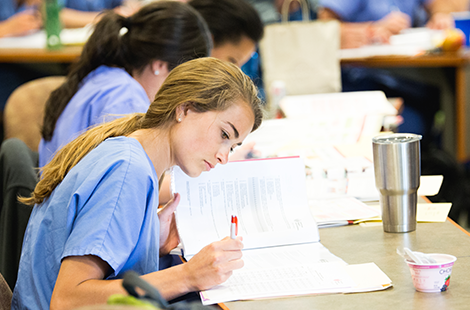Trevecca students achieve 100 percent pass rate on certifying exam


There is no such thing as a typical shift for Jeremy Gerber at his emergency medicine residency in Southern California.
On a weekly basis, he could expect to spend an evening rotating between units in the hospital; he could interpret lab and imaging results to treat a patient’s respiratory infection. Or he could help get a patient into emergency, life-saving surgery—all of which he learned to do as a student of Trevecca’s Physician Assistant (PA) program.
Gerber was part of the 2017 PA graduating class, which recently earned a 100 percent passing score on the Physician Assistant National Certifying Examination (PANCE).
Trevecca’s PA program has been in existence for more than 40 years and has graduated more than 1,000 students to date, sending into the community “competent physician assistants who will use their skills to serve their communities in compassionate ministry,” as the program’s mission statement proclaims.
As part of the 27-month program, students go through a 15-month period of classroom instruction and lab-based education to build medical knowledge and clinical skills, according to Joy Twillie, academic director and associate professor of the program.
At completion, students earn a Master of Science in Medicine (MSM) and move to take the PANCE. Graduates of physician assistant programs must take the exam before receiving a license to practice. According to the National Commission on Certification of Physician Assistants, the national first-time taker pass rate for the graduating class of 2016 was 96 percent.
Gerber said hearing his classmates all passed the PANCE just further boosted his confidence in his Trevecca education.
“I think Trevecca’s program really prepared us to care for the underserved and to have a heart for global missions,” he said. “We learned to care for our patients holistically—for their mind, body, and soul. It’s been a challenging transition into clinical practice for me in emergency medicine, but the education I got from Trevecca was...one-of-a-kind.”
Classmate Erin Goodwin said she had no doubt everyone had passed—she was just waiting for word that they had received a 100 percent pass rate. She echoes Gerber’s sentiments about the quality of education provided at Trevecca.
“Without [the foundation Trevecca provides], jumping into complex medicine would be even more of a challenge than it already is,” Goodwin said. “With the background, things click and come together in a way that I can’t explain. It’s very satisfying, and I am grateful daily for the education I received.”
Graduating students with that confidence is exactly what the program aims for.
Bret Reeves, director of the program, went to PA school while serving in the U.S. Army and later served at Fort Campbell with the 101st division. Reeves pointed the success of the students on the PANCE to the program’s challenging curriculum.
“What we teach, how we teach it and how we test is preparing the students all along,” he said. “What we’ve done—as opposed to waiting to help students prepare for the PANCE when they are about to graduate—is incorporated that preparation into our overall curriculum design from the start. That way, we are able to say to students, ‘You’ve been preparing all along. Here’s your finishing touches. Now go be successful on the exam.’”
Twillie explains that the program is built on Reeves’ maxim of “begin with the end in mind,” which serves to focus the program’s instructional objectives: student-focused instruction and close mentorship. This approach ensures success, they say.
“Our program’s goal is 100 percent PANCE pass rate, but as importantly, for the local medical community to think highly of our students,” Twillie said. “In PA education, we are creating medical practitioners in 27 months. That’s a daunting undertaking. But, as it says in the book of Isaiah, we build this education line upon line, precept upon precept. We work on each student excelling and reaching the endpoint of being able to take great care of patients. Teaching, mentoring, and developing students to become great clinicians—that’s what we are all about.”
By Bailey Basham
Media contact: Mandy Crow, mmcrow@trevecca.edu, 615-248-1695
